What Are the Best Consensus Alternatives in 2025?

Key highlights
Consensus is a leading demo automation tool, but not always the best fit for every team.
Teams often seek Consensus alternatives due to cost, setup complexity, and flexibility needs.
Top competitors include SmartCue, Navattic, Storylane, Walnut, Supademo, Saleo, Demoboost, and Demostack.
Tools differ in pricing plans, demo style, ease of use, and integrations.
SmartCue stands out for quick demo creation, personalization, and ease of use.
Navattic and Storylane are great for marketing teams needing fast, lightweight product tours.
Demostack and Saleo serve enterprise teams needing realistic, sandbox-style demos.
Choosing the right tool depends on budget, demo style, ease of building, and CRM integrations.
Repetitive live demos can be a significant drain on time and resources. While live demos are crucial for engaging with prospects, the need to repeat the same flow over and over can quickly become inefficient. Sales teams often find themselves spending hours on demos that could be automated, leaving less time for high-value tasks like closing deals and driving strategic initiatives.
That’s where demo automation tools like Consensus come in. They help scale interactive demos, track engagement, and free up presales teams to focus on more impactful activities. However, for smaller teams or those looking for simpler, more cost-effective solutions, Consensus might not be the best fit.
The good news? 2025 brings plenty of Consensus alternatives, from quick, no-code demo creation platforms to enterprise-grade sandbox environments. In this blog, we’ll explore the best options and help you figure out which tool actually fits your team.
Why Teams Are Considering Consensus Alternatives?
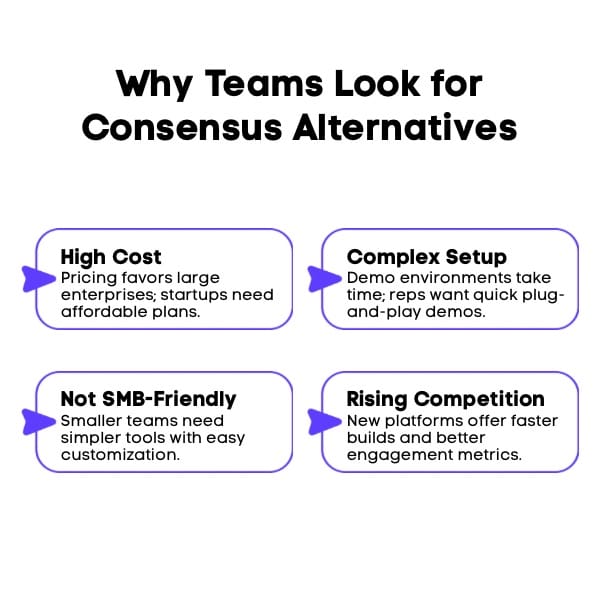
Consensus has earned its place as a go-to demo automation tool for many sales teams. But like any software, it’s not always the perfect match for every business model or team size. Depending on your sales workflows and budget, you might find yourself exploring other options that better fit your day-to-day needs.
Here are the most common reasons teams start evaluating Consensus alternatives in 2025:
High Costs for Smaller Teams: Consensus can be expensive, especially for startups and smaller teams with limited budgets. Teams are looking for more affordable options with flexible pricing or free plans.
Complicated Setup: The demo creation process in Consensus can be time-consuming and complex. Teams that need fast, easy-to-build interactive demos are turning to alternatives that offer a more intuitive setup.
Not Flexible Enough for SMBs: For smaller or agile teams, Consensus feels too heavy. They need tools that are simple to use, easy to customize, and don’t require engineering resources to create effective demos.
Competition Is Heating Up: The market for demo automation tools is growing, with competitors like SmartCue offering faster demo creation, better browser extensions, and more detailed engagement metrics, all without the enterprise-level overhead.
What Are the Top Consensus Alternatives in 2025?
1. SmartCue (G2 Rated 4.8/5)
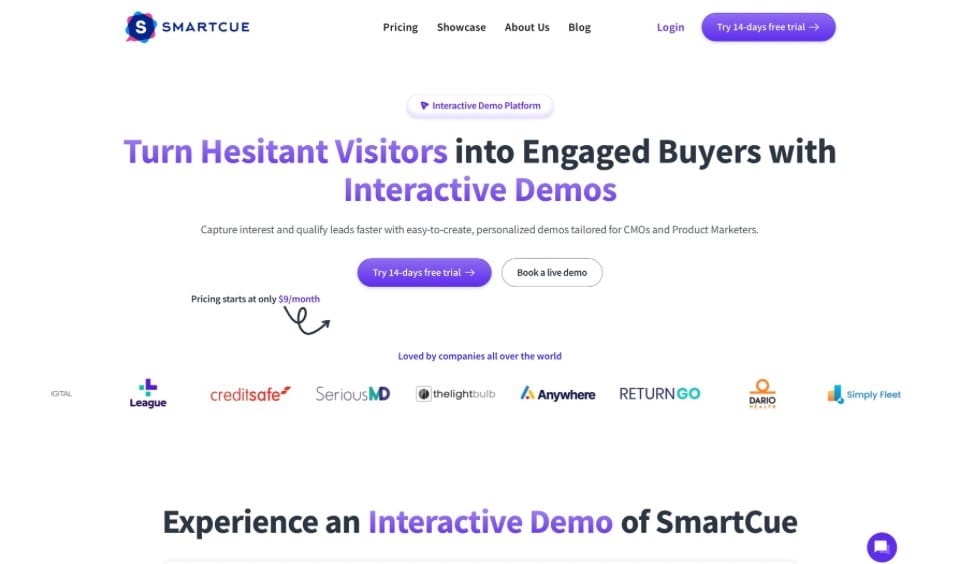
SmartCue is a no-code demo creation platform designed for sales, marketing, and customer success teams. It helps you build personalized interactive product demos in minutes, embed them on landing pages, and track engagement metrics. With its simple setup and CRM integrations, SmartCue makes it easy for teams to deliver demos without leaning on engineering.
Why Choose SmartCue Over Consensus?
Faster demo creation process (often just a few minutes).
Strong personalization options to tailor demo paths to specific use cases or personas.
Built to be used across the funnel, from marketing campaigns to customer success onboarding.
SmartCue’s ability to create demos in minutes and its focus on personalization makes it ideal for teams looking for quick deployment and flexibility, without relying on engineering.
SmartCue Pricing: Affordable Plans for Every Team
SmartCue offers a free trial and browser extension.
Offers transparent pricing tiers starting at $10 per user/month.
Who Is It Best For?
GTM teams looking for fast, tailored demo experiences.
Smaller teams looking for an affordable, lightweight solution.
Sales reps and marketers who need embedded product tours in landing pages or campaigns.
Why Users Love SmartCue: Hear from the Experts
“Initially, I procured SmartCue to enhance our product demos, aiming to provide a more immersive and interactive experience for our prospects. What I didn't expect was the sheer adaptability of the tool! Beyond its core functionality, SmartCue has truly outperformed my expectations.”
- Tony G., Sr. Product Marketing Specialist, Enterprise
Start your 14-day free trial today
2. Navattic (G2 Rated 4.8/5)
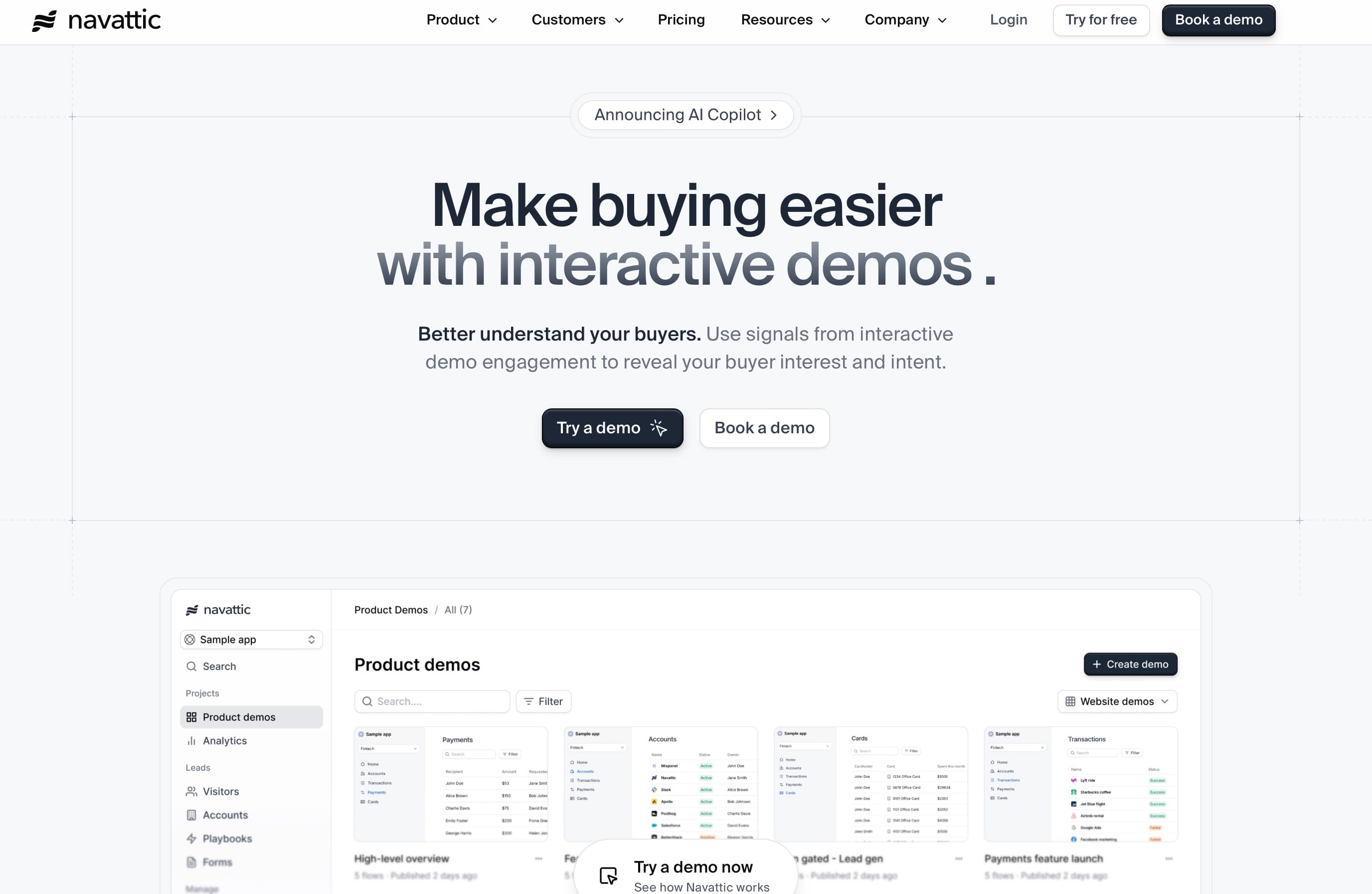
Navattic helps teams create interactive product tours with no code. Instead of full backend clones, it focuses on HTML capture and overlays, making it easy to spin up guided demos for top-of-funnel use.
Here’s Why Navattic Stands Out
Lightweight, faster to set up than sandboxed demo platforms.
Perfect for embedding demos on websites and landing pages.
Lower technical overhead while still offering strong buyer engagement analytics.
Navattic’s lightweight setup and focus on HTML overlays make it a better option for teams needing faster and simpler demo creation with minimal technical overhead compared to Consensus.
Pricing Details
Plans start with a free tier for one demo, with paid plans beginning around $500/month and scaling with usage.
Who Benefits the Most from Using Navattic?
Marketing teams who want interactive demos on landing pages.
Sales teams needing simple demo experiences to capture leads.
Startups looking for budget-friendly demo automation.
What Are Real Users Saying?
“Navattic excels in creating engaging and interactive product demos that effectively showcase key features and benefits. The platform is intuitive, making it easy to customize demos with rich multimedia elements like anchors, automation and images.”
- James O
3. Storylane (G2 Rated 4.8/5)
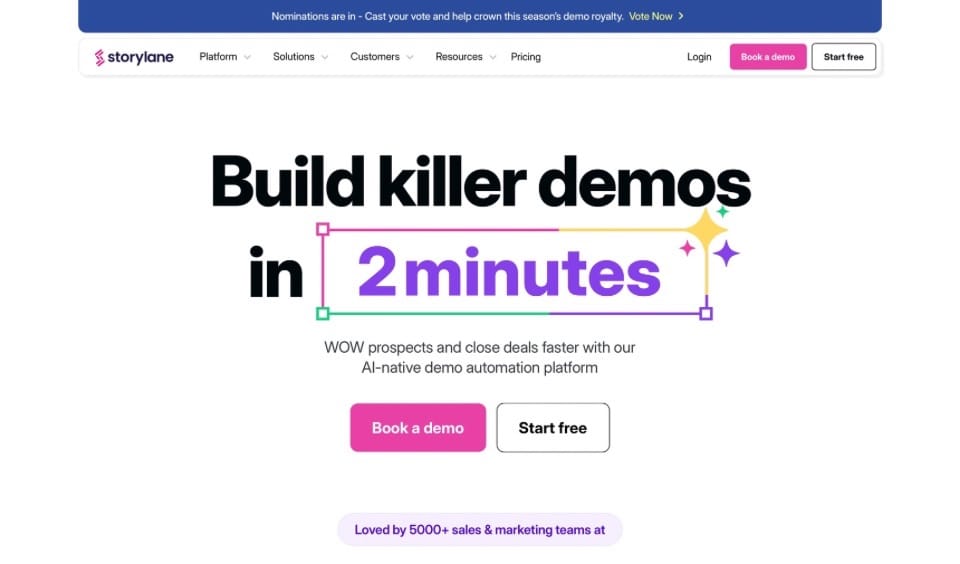
Storylane is a demo creation platform that supports HTML, screenshot, and video demos. It offers AI-assisted features like voiceovers and auto demo flows, making it easy for non-technical teams to build and share interactive demos quickly.
What Makes Storylane a Top Choice vs. Consensus?
What Makes Storylane a Top Choice vs. Consensus?
Supports multiple demo formats, including interactive video demos.
User-friendly with AI tools that speed up the demo creation process.
Flexible for sales, marketing, and customer success teams.
Storylane’s AI-driven features and diverse demo formats make it the better choice for teams wanting flexibility and speed in creating high-quality demos, especially compared to Consensus’s more rigid template options.
Storylane’s Pricing Explained
Storylane offers a free plan and paid tiers starting around $40/month, with Growth and Enterprise options for larger teams.
Who Should Use Storylane?
Smaller teams testing demo automation for the first time.
Marketing and sales reps who want to create demo videos without coding.
Teams looking for variety in demo formats.
Real Stories from Real Users of Storylane
“Storylane is incredibly helpful for demoing nuanced workflows in a product demo. Especially for workflows that are hard to set up and replicate in a sandbox environment.“
- Joe G
4. Walnut (G2 Rated 4.5/5)
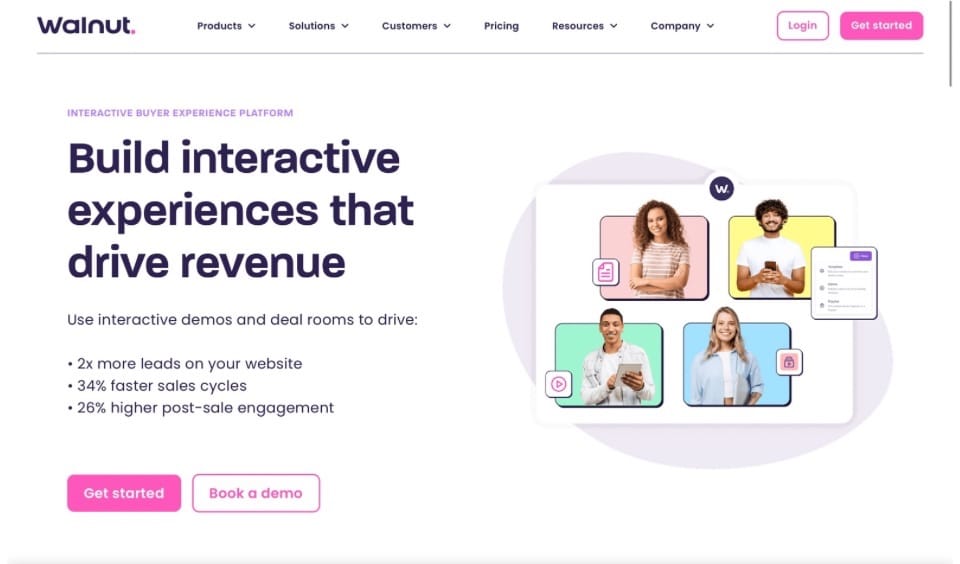
Walnut is a no-code demo automation software tool that allows teams to create personalized, interactive demos using a browser extension. It’s built with sales teams in mind, offering demo libraries, analytics, and customization options.
Why Walnut Could Be the Better Fit for Your Demo Needs?
Simple to build and edit interactive product tours.
Features like demo libraries help standardize demos across sales reps.
Designed for repeatable sales workflows.
While Walnut offers strong customization and repeatable workflows, it doesn’t provide the same level of buyer-led demo automation and deep analytics offered by Consensus.
How Walnut Fits Your Budget
Walnut offers a free starter plan, with paid tiers beginning around $750/month and scaling up to custom enterprise pricing.
Who Should Consider Walnut for Demos?
Mid-market sales teams who want scalable demo libraries.
Sales reps who need on-demand, personalized demo experiences.
Teams prioritizing engagement metrics and analytics.
What Are Real Users Saying?
“Using Walnut, it's so easy to create clickable demos to show during calls or to send to customers afterwards. Within a minute you can add a customer's logo to personalize the experience. Still some kinks in actually creating the demos, organizing them, and customizing - it took me a while to do the initial creation. Also it doesn't save automatically.”
- Aviva R
5. Supademo (G2 Rated 4.7/5)
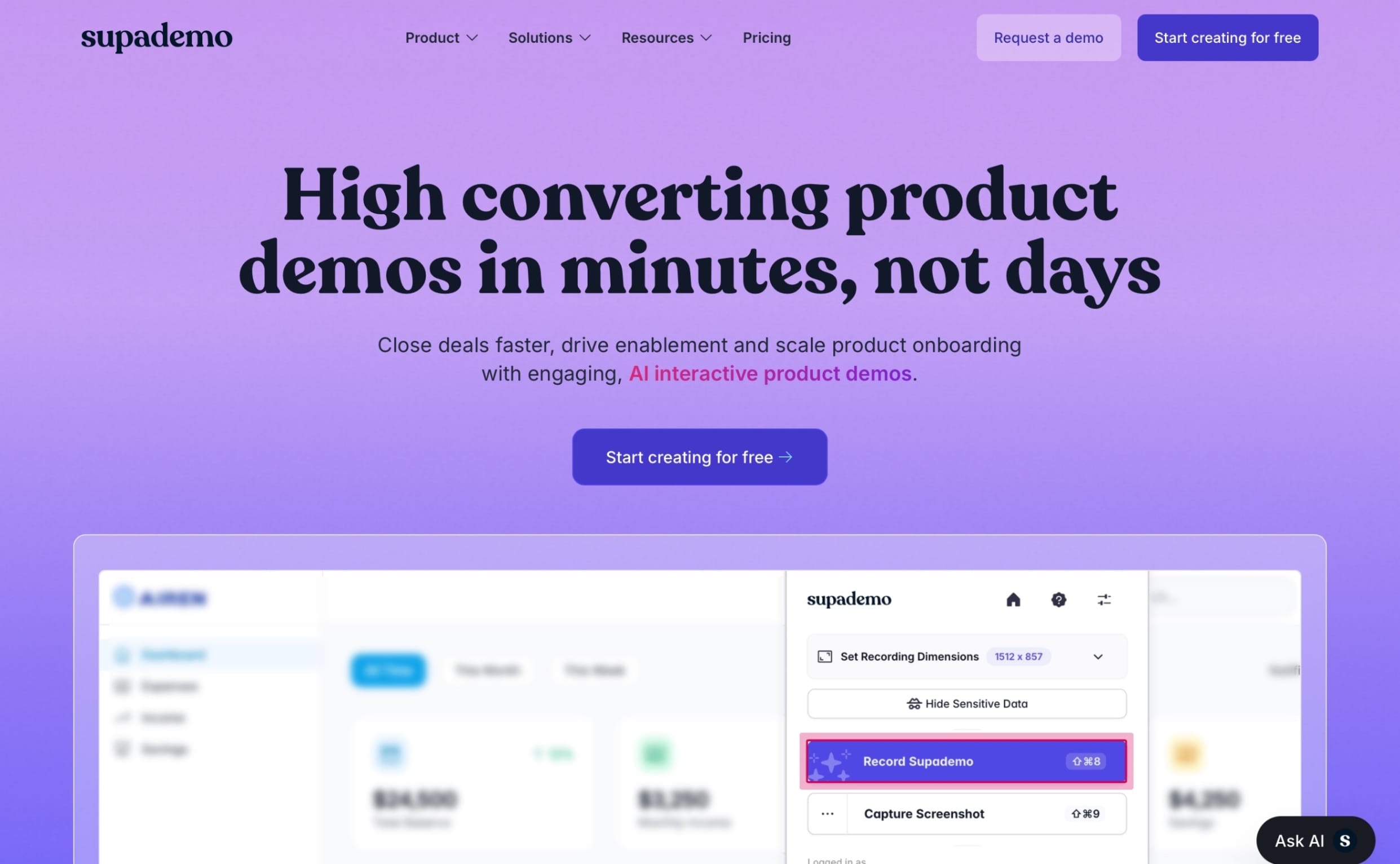
Supademo is a lightweight demo automation tool focused on simplicity. It allows teams to create screen recordings, screenshot-based demos, and interactive product demonstrations, making it flexible for sales, onboarding, and marketing.
Why Supademo Beats Consensus for Your Demos?
Multiple demo formats (screenshots, HTML, demo videos).
Budget-friendly and fast setup for smaller teams.
AI-assisted creation speeds up the demo creation process.
Supademo offers a simpler, budget-friendly alternative for teams that need speed and flexibility without the complexity and higher costs of Consensus.
What You’ll Pay for Top Features
Transparent plans: Free plan available, Pro around $27/seat/month, Scale $38/seat/month, and custom enterprise tiers.
Is Supademo the Right Fit for Your Business?
Startups or SMBs testing demo automation software tools.
Teams that need a free plan before committing.
Use cases across sales, onboarding, and marketing.
Supademo in Action: Genuine User Testimonials
“The ability to add and remove hotspots and the customization in the focused area makes it fitting for a variety of use cases. Inability to change the font size and not being able to import screens and hotspots from another supademo.”
6. Saleo (G2 Rated 4.9/5)
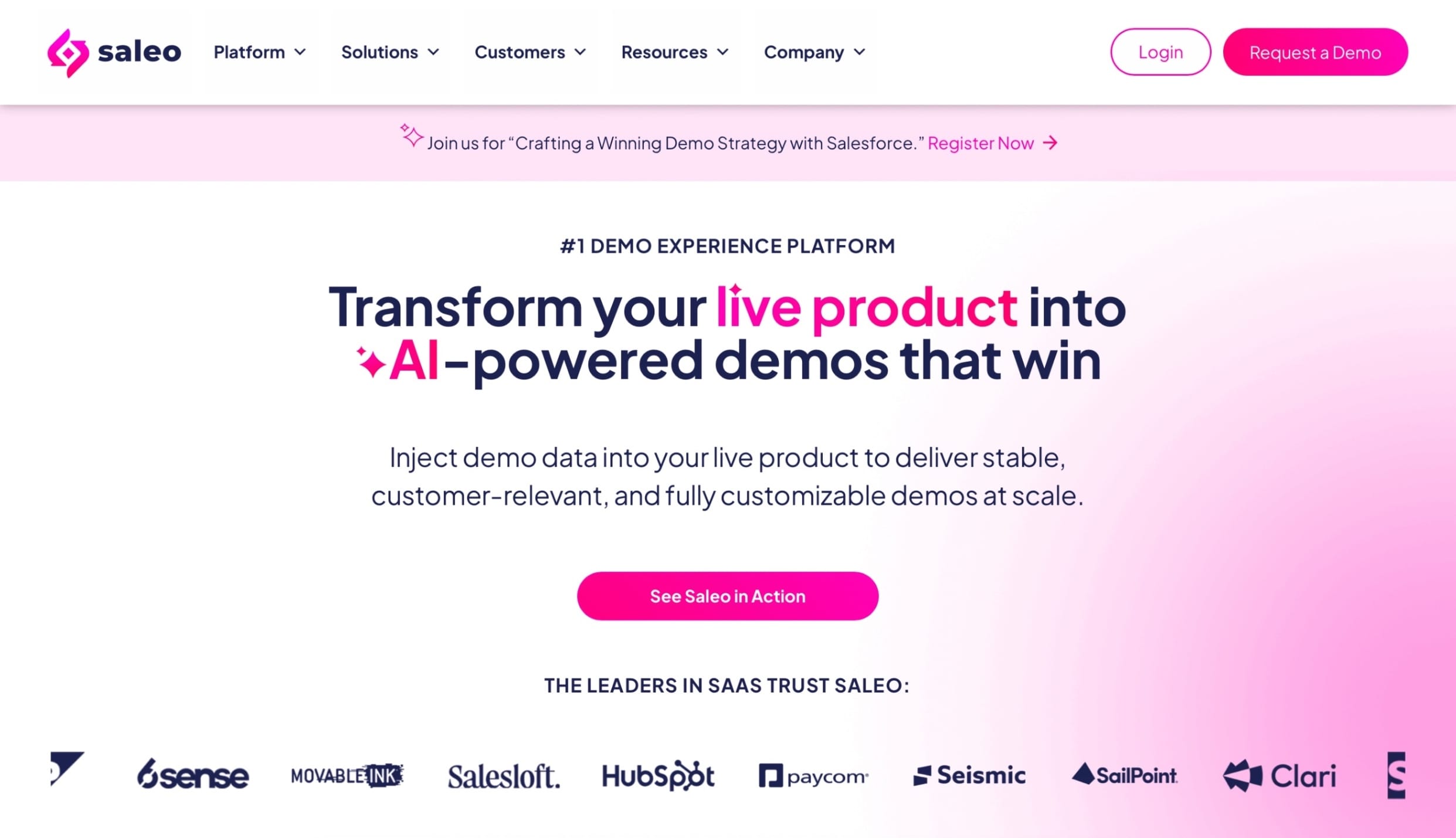
Saleo specializes in live product demos with real-time data overlays. It makes your live product look and perform flawlessly by masking or controlling data, giving prospects an authentic experience without risks.
Why Saleo Could Be Your Better Demo Solution
Ideal for products where real data and workflows matter.
Ensures live demos run smoothly by controlling the demo environment.
Strong fit for data-heavy SaaS platforms.
Saleo offers superior control over live demo environments, particularly for data-driven SaaS products, which Consensus lacks in terms of real-time data management.
Pricing Details
No public tiers; pricing is custom based on demo complexity, seats, and features.
Who Can Benefit Most from Saleo?
Enterprise teams needing interactive product demonstrations with real data.
Presales engineers running complex sales calls.
Products where specific features rely on data interactions.
Hear from Real Saleo Users
“It is great for days or people who don't have their demo sites up to par, like forgetting to run payroll, not having a lot of data to display especially if you are behind, that kind of aspect. It helps make their setups and build look pristine and more stream lined. It can be annoying to duplicate certain details or processes like your logo or name, but otherwise it is at least simple.”
7. Demoboost (G2 Rated 4.9/5)
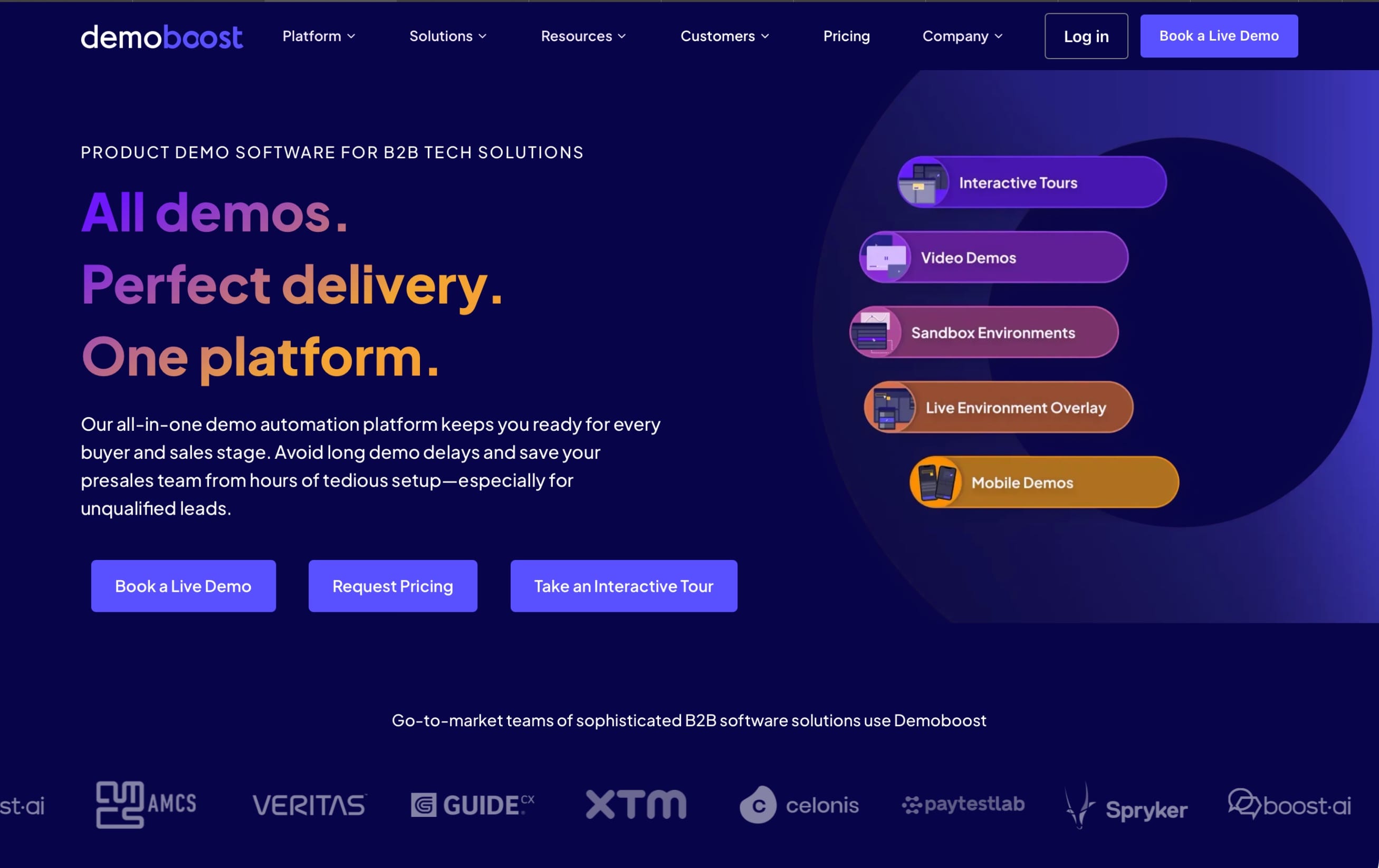
SaleoDemoboost is an all-in-one demo creation platform offering interactive demos, video demos, and personalization features. It emphasizes both demo creation and distribution, making it easy to track buyer engagement.
Why Reasons for Choosing Demoboost Over Consensus
Offers both video and interactive demos in one platform.
Built-in demo distribution and tracking for sales enablement.
Strong reporting to measure engagement metrics.
Demoboost’s built-in demo distribution and tracking makes it a more comprehensive solution for sales teams who need both creation and analytics in one place, unlike Consensus which requires third-party tools for distribution.
Pricing Breakdown
Pricing is custom; typically based on users, demos, and advanced specific features.
Is Demoboost Right for You?
Teams that want to manage demos and distribution in one place.
Customer success teams who use demos for onboarding and training.
Organizations wanting multi-format demo content.
What Users Are Saying About Demoboost‘s Impact
“It's been really easy to start with Demoboost. Slick UX and clear instructions.”
- Audrey V
8. Demostack (G2 Rated 4.7/5)
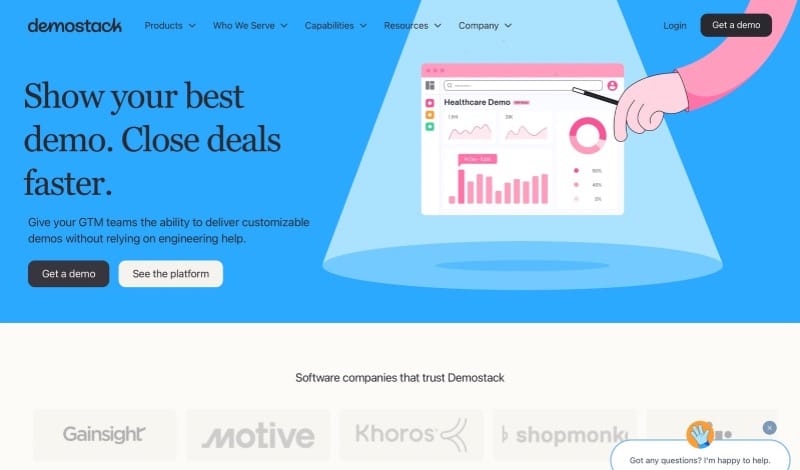
Demostack is a high-fidelity demo automation platform that clones your product’s front end to create realistic sandbox demos. It delivers interactive product tours that feel almost identical to the live product, complete with customization options.
Why Choose Demostack Over Consensus?
Best for complex SaaS products that need demo environments close to production.
Allows for detailed customization of flows and specific features.
Ideal for enterprise sales teams and presales engineers.
Demostack excels at creating realistic sandbox environments, offering a level of fidelity and customization that is perfect for enterprise SaaS products, surpassing Consensus’s more simplified demo tools.
How Much Does Demostack Cost?
Plans start at $55,000 per year for the Standard package.
Pricing can go up to $150,000 per year for the Platinum plan with advanced features and higher user limits.
Who Should Consider Demostack for Demos?
Enterprise SaaS with complex workflows.
Sales engineers running in-depth product demonstrations.
Teams needing demo fidelity with real data simulation.
Demostack User Reviews: Real Feedback from the Field
“The ability to share product sandboxes that send real-time alerts when buyers interact with them keeps the conversation going even after the initial call ends.”
- Declan T
Consensus Alternatives: Quick Comparison Table
With so many demo automation tools on the market, it’s tough to know which one actually fits your team. Some lean enterprise, some are lightweight and fast, and others specialize in interactive product tours or live demos.
Here’s a quick side-by-side comparison of Consensus and its best alternatives in 2025:
Tool | Pricing (Annual/Seat) | Demo Style | Best Fit |
|---|---|---|---|
Consensus | Custom enterprise (often $50k+) | Interactive product demos, video demos | Enterprise sales & presales teams |
SmartCue | Custom (free trial available) | Personalized interactive demos, product tours | GTM teams, SMBs, fast demo creation |
Navattic | From ~$500/mo to enterprise | HTML-based interactive product tours | Marketing teams embedding demos on web/LPs |
Storylane | Free plan, paid from ~$40/mo | HTML, video, screenshot demos | Small to mid-sized teams, multi-format demos |
Walnut | Starts ~$600/mo, enterprise tiers | Browser extension, interactive demos, demo library | Mid-market sales teams standardizing demos |
Supademo | Free plan; Pro ~$27/seat/mo | Screenshot, HTML, interactive video demos | Startups, SMBs, lightweight demo creation |
Saleo | Custom enterprise pricing | Live product demos with data overlays | Data-heavy SaaS, presales engineers |
Demoboost | Custom pricing | Interactive + video demos, distribution | Sales enablement, multi-format demo needs |
Demostack | $55k–$150k/year | Sandbox cloning, high-fidelity demos | Enterprise SaaS, complex workflows |
How to Pick the Right Consensus Alternative?
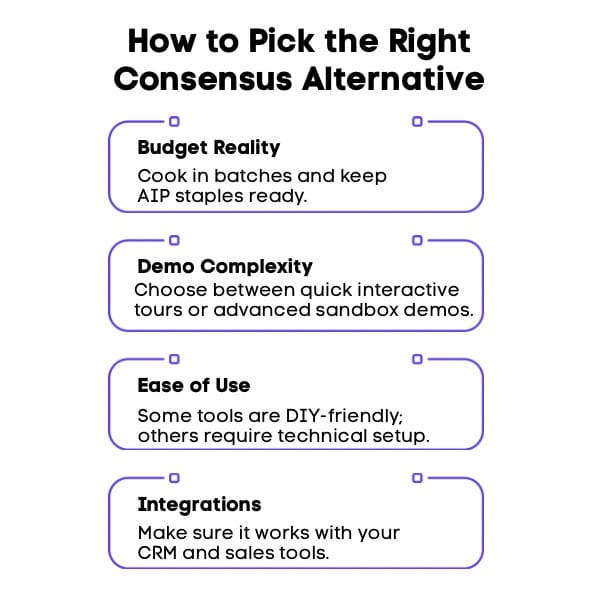
Every team has different demo needs. Some want lightweight interactive product tours for landing pages, while others need full sandbox demo environments that mirror the live product. Picking the right tool comes down to matching features with how your team actually works.
Here are the key factors to weigh before you choose a Consensus alternative:
1. Budget Reality
If under $1k/month: Consider tools like SmartCue or Navattic, which offer affordable plans starting from $10/user/month and provide fast demo creation and easy setup.
If enterprise-level needs: Look into Demostack or Saleo for robust, high-fidelity demos with customization and full CRM integrations, but be prepared for higher costs (starting at $55k/year for Demostack).
2. Demo Complexity
For simple, lightweight demos: If you need quick, interactive product tours for lead capture, SmartCue, Navattic, or Storylane offer fast setup and user-friendly interfaces.
For high-fidelity, sandbox demos: If you need realistic, immersive product experiences that mirror your live app, Demostack or Saleo are your best bet.
3. Ease of Building
For fast, no-fuss demo creation: Tools like SmartCue, Supademo, or Storylane allow sales teams to create and deploy demos in minutes, with minimal setup or technical support required.
For more complex demo environments: Walnut and Demostack are ideal if you need more customization and are willing to invest extra time in setup.
4. Integrations That Matter
If CRM and sales workflow integration are key: SmartCue, Walnut, and Demoboost offer strong CRM integrations (e.g., Salesforce, HubSpot) and rich analytics that connect directly to your sales process.
For limited integrations or simpler setups: Tools like Supademo or Storylane work well if you're looking for basic demo automation without the need for extensive CRM syncing.
What’s the Smartest Move for Your Team?
The search for the right Consensus alternative isn’t about finding the tool with the longest feature list — it’s about finding the one your team will actually use. For some, that means enterprise-heavy sandbox demo environments; for others, it’s about lightweight interactive demos that sales and marketing teams can spin up in minutes.
The best next step is to trial a couple of platforms that fit your needs and see how they perform in real sales conversations. Most vendors offer a free trial, so you’ll quickly learn which tool feels intuitive, keeps your demo creation processsmooth, and drives more buyer engagement.
If you’re looking for a balance of ease of use, personalization, and speed, many teams find SmartCue to be a great starting point. It’s simple enough for smaller teams but flexible enough to scale as your sales process grows, making it one of the best Consensus alternatives to test first.
Frequently Asked Questions
How do top Consensus competitors compare in terms of pricing and features?
Consensus competitors vary widely in cost and capabilities. Entry-level tools like Supademo and Storylane start with free or low-cost plans, while enterprise platforms like Demostack and Saleo can reach six figures annually. Features differ from quick product tours to advanced sandbox environments.
Which tools offer similar features to Consensus for demo automation?
SmartCue, Navattic, Storylane, Walnut, and Demoboost all provide interactive demos, analytics, and personalization features similar to Consensus. The main differences lie in demo style, ease of setup, and how well they fit smaller teams versus enterprise-level use cases.
What are the main criteria to consider when choosing between Consensus and its alternatives?
Teams should weigh budget, demo style, ease of demo creation, and integrations. Smaller teams often need simple, affordable product tours, while enterprises may prefer robust sandbox environments with advanced customization and CRM integration to support complex sales workflows and buyer engagement.
Which Consensus alternatives offer demo automation with AI-powered features?
Supademo and Storylane have introduced AI features such as auto-generated demos, voiceovers, and smart flows. These capabilities reduce setup time, helping sales and marketing teams quickly create polished, interactive product demonstrations without relying heavily on engineering or technical support.
What are the best Consensus alternatives for AI-powered literature searches?
Consensus for demo automation should not be confused with Consensus.app, the AI research tool. For literature searches, top alternatives include Elicit, Scite, Research Rabbit, and SciSpace, which help researchers explore, summarize, and evaluate academic papers efficiently with AI.
Are there any highly rated Consensus alternatives recommended for researchers in 2025?
Yes, researchers often turn to Elicit and SciSpace for AI-assisted literature reviews. Both are highly rated for usability and accuracy, offering smart summaries and citation management. Scite is also praised for showing how studies support or dispute claims, adding valuable context.